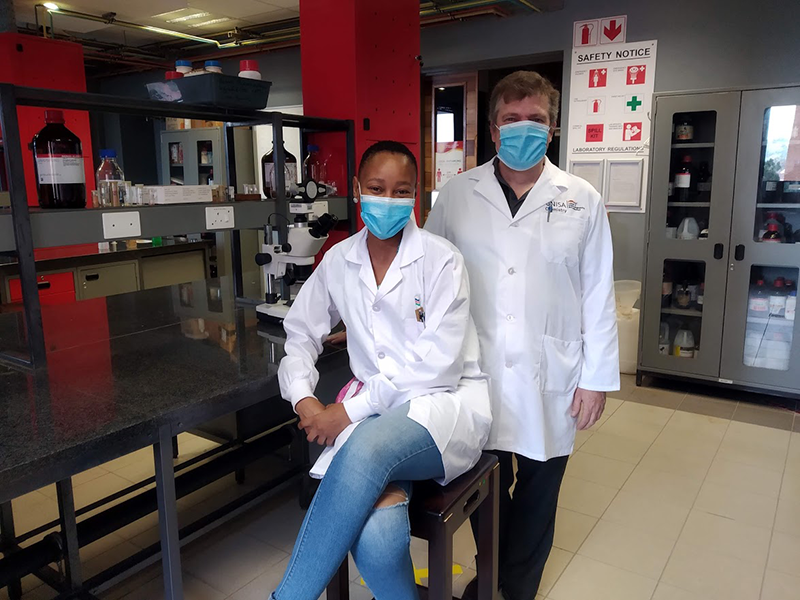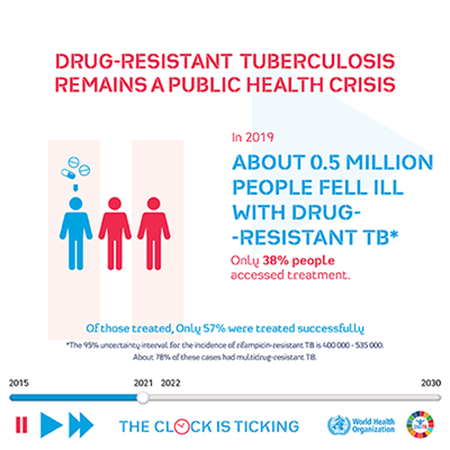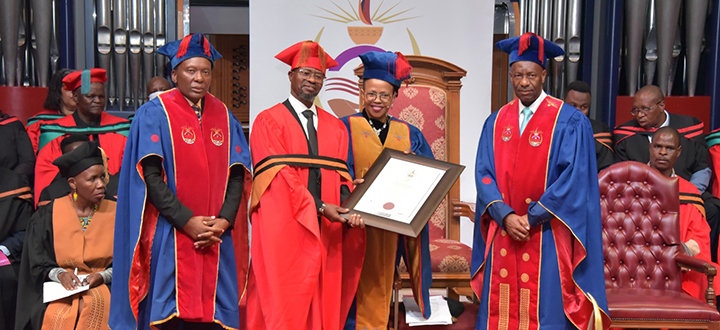College of Agriculture & Environmental Sciences
Collaboration key to combat scourge of TB

Itumeleng Setshedi (CAES Laboratories, Life Sciences) and Dr Mark Smith (Department of Chemistry, CSET)
 March is TB awareness month. Two Unisa colleges—the College of Agriculture and Environmental Sciences (CAES) and the College of Science, Engineering, and Technology (CSET)—have joined forces and started a research group to tackle the challenge of multi-drug resistant tuberculosis. The two parts of the research group are headed by Itumeleng Setshedi of the CAES Laboratories, Life Sciences and Dr Mark Smith of the Department of Chemistry, CSET, respectively.
March is TB awareness month. Two Unisa colleges—the College of Agriculture and Environmental Sciences (CAES) and the College of Science, Engineering, and Technology (CSET)—have joined forces and started a research group to tackle the challenge of multi-drug resistant tuberculosis. The two parts of the research group are headed by Itumeleng Setshedi of the CAES Laboratories, Life Sciences and Dr Mark Smith of the Department of Chemistry, CSET, respectively.
Tuberculosis is amongst the biggest contributors of disease related mortality in the world and a leading associated killer of HIV-positive people, accounting for about 35% deaths globally according to the World Health Organisation. Africa is unfortunately experiencing a continued aggressive attack of this disease on its most disadvantaged communities. Unfortunately, TB remains an intimidating challenge highlighted as a leading cause of disease-related death in South Africa, where nearly one in every 100 people is infected. These statistics are alarming as they are three times higher than the rest of Africa and six times higher than any other country in the world.
The first focus of the research group is the design and synthesis of new multi drug-resistant TB drugs. This part of the research, the chemistry part, involves looking at the structure of existing anti-TB drugs to gain insight as to how these are deactivated by the TB bacteria. The drugs are then modified by changing parts of the drugs that are attacked by the bacteria, thereby preventing the bacteria from deactivating the drugs, while at the time, keeping the active part of the drugs unchanged.
Another core research focus of this section is crystal engineering, where certain physical properties of the drugs (which have a crystalline form) are carefully controlled to improve their efficacy.
The historic traditional use of plants as a source of medicine to treat various ailments goes back centuries. South Africa, among other African countries, has a rich background in indigenous knowledge systems, which are a source of ethnopharmacological data that allow researchers to tap into therapeutic properties of plants, as plants have proven to harbour molecules with various therapeutic properties.
This serves as justification for the third research focus of this research group, which is to conduct biological investigation on several medicinal plants as a cradle of novel anti-TB drug leads. This part of the project is done with the guidance of Dr Prudence Kabongo-Kayoka, Senior Lecturer in the Department of Agriculture and Animal Health, CAES, who has vast experience in tuberculosis research and bioassays, among other expertise. By tapping into her network of collaborators at the National Health Laboratory Services (NHLS) (University of Pretoria, Steve Biko Hospital), assays on clinical isolates will be conducted at the NHLS facilities.
The research group is externally funded by the National Research Foundation (NRF). Setshedi and Smith each have individual Thuthuka grants for their respective roles in the project. These include funding for postgraduate students (from honours to PhD level) in Life Sciences and Chemistry. At the moment, several master’s and honours students are involved in the group. The group has already made progress towards achieving its goals and presents exciting opportunities for students who wish to pursue their studies in the life sciences or chemistry, while at the same time joining the fight against the scourge of tuberculosis in this country.
*Submitted by Itumeleng Setshedi, CAES Laboratories, Life Sciences
*Graphics sourced from WHO.

Publish date: 2021-03-24 00:00:00.0

 Young Unisa doctoral graduate joins elite Lindau Nobel Laureate group
Young Unisa doctoral graduate joins elite Lindau Nobel Laureate group
 Education MEC addresses Unisa autism seminar
Education MEC addresses Unisa autism seminar
 Seven Unisans nominated for the NSTF-South32 Awards 2023/2024
Seven Unisans nominated for the NSTF-South32 Awards 2023/2024
 Unisa awards posthumous honorary doctorate to literary maven, OK Matsepe
Unisa awards posthumous honorary doctorate to literary maven, OK Matsepe
 From humble beginnings to academic leadership
From humble beginnings to academic leadership